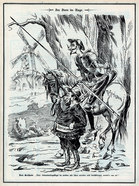
Unternavigation
On 20th May 1900, around 70 percent of voters rejected the federal bill on health, accident and military insurance despite the support of all political parties and trade associations. The electorate followed the arguments of a broad opposition comprising liberal anti-centrists in western Switzerland, conservatives, private insurance companies and some members of the agricultural and working class communities. In particular, anti-statist arguments presented by health and assistance funds that feared for their autonomy caught on with the voters.
The bill passed with a large majority in the Federal Assembly in October 1899 had been drafted by National Councillor Ludwig Forrer. The FDP politician was at the forefront of the push for social security. Although the complex, 400 articles strong legislative proposal was limited to employed workers, it represented a major step forward. For the first time, it prescribed mandatory insurance for most wage earners, while offering others the option of voluntary insurance. Soldiers would also have been covered. The insurance would not only have assumed treatment costs, but also included illness, childbed and death benefits allowances. The accident and military insurance would have granted coverage of disability and survivors’ pensions too. The insurance was to be funded by federal contributions as well as employer and employee premiums. Parliament intended to hand over implementation to both existing private health insurance funds and new public funds yet to be created, as well as to the planned Swiss Institute for Accident Insurance. A federal insurance court was envisaged as the relevant appellate court.
The voters' rejection of the bill brought an abrupt end to the dream of comprehensive risk cover. As a result, further social welfare development was dependent on small increments in policy during the following decades. Nevertheless, military insurance commenced provision already in 1902. And in 1912, voters accepted a more streamlined version of the health and accident insurance bill; it was limited to mandatory accident insurance and contained no fundamental reforms to health insurance.
Literatur / Bibliographie / Bibliografia / References: Degen Bernard (1997), Haftpflicht bedeutet den Streit, Versicherung den Frieden: Staat und Gruppeninteressen in den frühen Debatten um die schweizerische Sozialversicherung, in H. Siegenthaler (ed.), Wissenschaft und Wohlfahrt. Moderne Wissenschaft und ihre Träger in der Formation des schweizerischen Wohlfahrtstaates während der zweiten Hälfte des 19. Jahrhunderts, 137–154, Zürich.
(12/2014)




